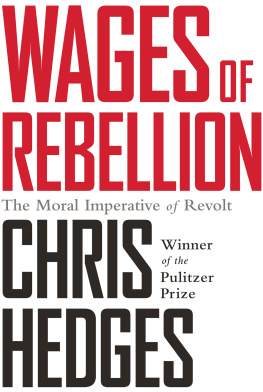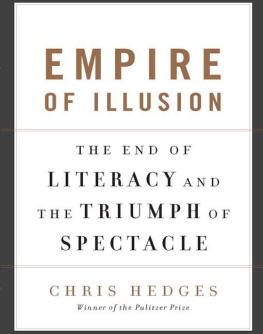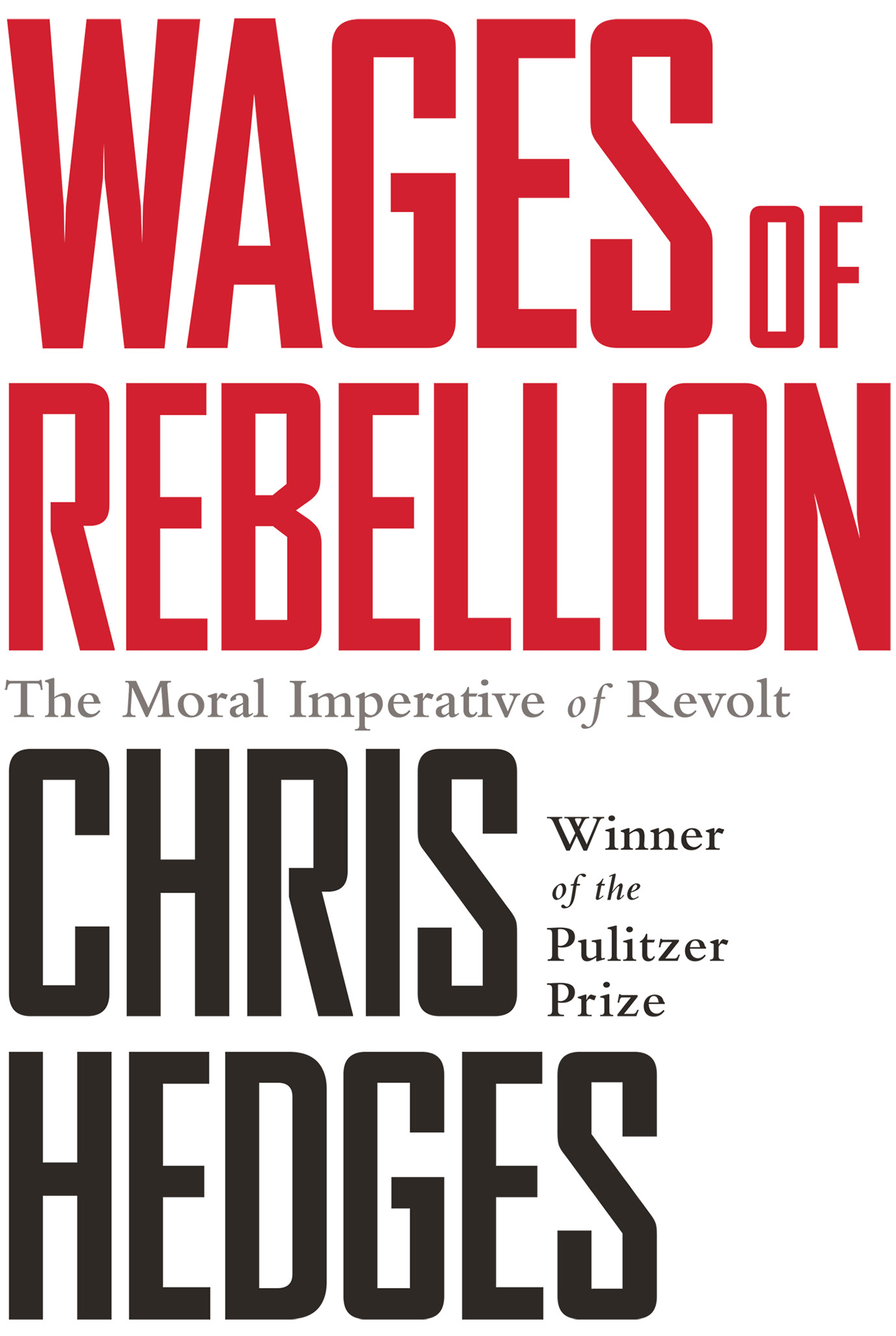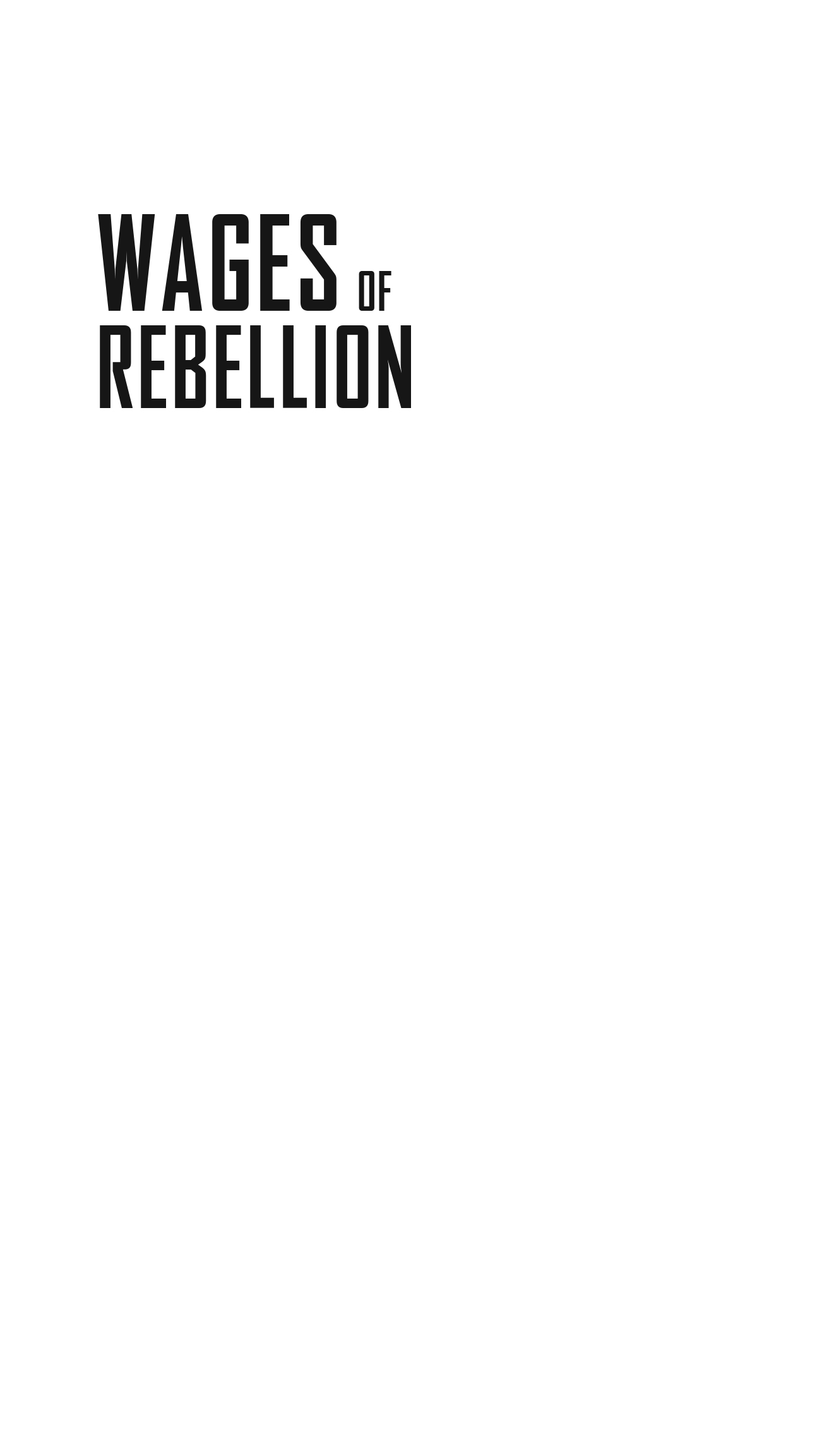Also by Chris Hedges
War Is a Force That Gives Us Meaning
What Every Person Should Know About War
Losing Moses on the Freeway
American Fascists
I Dont Believe in Atheists
Collateral Damage
Empire of Illusion
Death of the Liberal Class
The World As It Is
Days of Destruction, Days of Revolt (with Joe Sacco)
Copyright 2015 by Chris Hedges.
Published by
Nation Books, A Member of the Perseus Books Group
116 East 16th Street, 8th Floor
New York, NY 10003
Nation Books is a co-publishing venture of the Nation Institute and the Perseus Books Group.
All rights reserved. Printed in the United States of America. No part of this book may be reproduced in any manner whatsoever without written permission except in the case of brief quotations embodied in critical articles and reviews. For information, address the Perseus Books Group, 250 West 57th Street, 15th Floor, New York, NY 10107.
Books published by Nation Books are available at special discounts for bulk purchases in the United States by corporations, institutions, and other organizations. For more information, please contact the Special Markets Department at the Perseus Books Group, 2300 Chestnut Street, Suite 200, Philadelphia, PA 19103, or call (800) 810-4145, ext. 5000, or e-mail .
Set in 11 point Minion Pro
Library of Congress Cataloging-in-Publication Data
Hedges, Chris.
Wages of rebellion / Chris Hedges.
pages cm
Includes bibliographical references and index.
ISBN 978-1-56858-490-4 (e-book) 1. RevolutionsSocial aspects. 2. Social movements. 3. Protest movements. I. Title.
HM876.H43 2015
303.48'4dc232014044940
10 9 8 7 6 5 4 3 2 1
For Eunice,
y en cuanto a m no olvides que si despierto y lloro
es porque en sueos slo soy un nio perdido
que busca entre las hojas de la noche tus manos
Contents
Herbert Marcuse, Repressive Tolerance
The pious say that faith can do great things, and, as the gospel tells us, even move mountains. The reason is that faith breeds obstinacy. To have faith means simply to believe firmlyto deem almost a certaintythings that are not reasonable; or, if they are reasonable, to believe them more firmly than reason warrants. A man [or woman] of faith is stubborn in his [or her] beliefs; he [or she] goes his [or her] way, undaunted and resolute, disdaining hardship and danger, ready to suffer any extremity.
Now, since the affairs of the world are subject to chance and to a thousand and one different accidents, there are many ways in which the passage of time may bring unexpected help to those who preserve in their obstinacy. And since this obstinacy is the product of faith, it is then said that faith can do great things.
Francesco Guicciardini, Ricordi
The civilization and justice of bourgeois order comes out in its lurid light whenever the slaves and drudges of that order rise against their masters. Then this civilization and justice stand forth as undisguised savagery and lawless revenge ... the infernal deeds of the soldiery reflect the innate spirit of that civilization of which they are the mercenary vindicators. ... The bourgeoisie of the whole world, which looks complacently upon the wholesale massacre after the battle, is convulsed by horror at the desecration of brick and mortar.
Karl Marx, The Civil War in France
W e live in a revolutionary moment. The disastrous economic and political experiment that attempted to organize human behavior around the dictates of the global marketplace has failed. The promised prosperity that was to have raised the living standards of workers through trickle-down economics has been exposed as a lie. A tiny global oligarchy has amassed obscene wealth, while the engine of unfettered corporate capitalism plunders resources; exploits cheap, unorganized labor; and creates pliable, corrupt governments that abandon the common good to serve corporate profit. The relentless drive by the fossil fuel industry for profits is destroying the ecosystem, threatening the viability of the human species. And no mechanisms to institute genuine reform or halt the corporate assault are left within the structures of power, which have surrendered to corporate control. The citizen has become irrelevant. He or she can participate in heavily choreographed elections, but the demands of corporations and banks are paramount.
History has amply demonstrated that the seizure of power by a tiny cabal, whether a political party or a clique of oligarchs, leads to despotism. Governments that cater exclusively to a narrow interest group and redirect the machinery of state to furthering the interests of that interest group are no longer capable of responding rationally in times of crisis. Blindly serving their masters, they acquiesce to the looting of state treasuries to bail out corrupt financial houses and banks while ignoring chronic unemployment and underemployment, along with stagnant or declining wages, crippling debt peonage, a collapsing infrastructure, and the millions left destitute and often homeless by deceptive mortgages and foreclosures.
A bankrupt liberal class, holding up values it does nothing to defend, discredits itself as well as the purported liberal values of a civil democracy as it is swept aside, along with those values. In this moment, a political, economic, or natural disasterin short a crisiswill ignite unrest, lead to instability, and see the state carry out draconian forms of repression to maintain order. This is what lies ahead.
The historian Crane Brinton, in his 1965 book The Anatomy of Revolution, explores the preconditions for revolution in the English, French, American, and Russian Revolutions. He cites a discontent that affects nearly all social classes, including economic grievances... not in the form of economic distress, but rather a feeling on the part of some of the chief enterprising groups that their opportunities for getting on in this world are unduly limited by political arrangements. Corporations, in a modern twist on the same exploitation of those most inclined to support them, defraud shareholders and investors, especially the small investors in the middle class who make up the bulwark of a capitalist democracy.
Brinton lists other preconditions for revolution, including a unified solidarity in opposition to a tiny, discredited power elite; a refusal by the press, scholars, and intellectuals to continue to defend the actions of the ruling class; an inability of government to respond to the most basic needs of citizens; and a steady loss of will within the power elite to rule. The denial of opportunities to the sons and daughters of the professional class and the middle class galvanizes resistance. A crippling isolation soon leaves the power elite with neither allies nor outside support. Finally, the state is convulsed by a crisisusually triggered by economic instability and often accompanied by military defeat, as was the case in Czarist Russia, or a long and futile conflict, as is the case with our own wars in Afghanistan and Iraq. It is at the moment of crisis that revolution begins.
It is never the poor, however, who make revolutions, as understood by Karl Marx and Friedrich Engels, who disdained the revolutionary potential of the Lumpenproletariat. Marx and Engels correctly saw the















